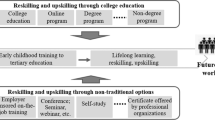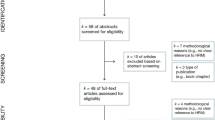Abstract
This paper investigates the managerial competences required for the complex interactions required to successfully integrate an Enterprise Resource Planning system into an organization—the ERP journey. A feature of the study (a five year longitudinal study of a Danish production company implementing SAP R/3) was the rise and fall of the ERP project managers. The study showed that different stages of the ERP journey required different competences from the managers. A manager with a certain competence mix might successfully oversee part of the ERP journey, but a different blend of competences was required to manage other parts. The paper concludes that a wide range of competences are required: personal, business and technical. The competence mix should be expected to vary through the journey, and is often too much to expect of one person.
Similar content being viewed by others
References
Appleton EL. How to survive ERP. Datamation 1997;43(3):50–53.
Bancroft NH. Implementing SAP R/3. Greenwich: Manning, 1996.
Bingi P, Sharma MK, Godla JK. Critical issues affecting an ERP implementation. Information System Management 1999;16(5): 7–15.
Boudreau MC, Robey D. Organizational transition to enterpirse resource planning systems: Theoretical choices for process research. In: Proceedings of the International Conference on Information Systems. Charlotte, North Carolina, USA, 1999:291–299.
Cameron PD, Meyer SL. Rapid ERP implementation–A contradiction? Management Accounting 1998;80(6):58–60.
Cliffe S. ERP Implementation. Harvard Business Review 1999; 77(1):16–21.
Dreier A. Organizational learning and competence development. The Learning Organization 2000;7(4):52–61.
Eisenhardt K. Building theories from case study research. Academy of Management Review 1989;14(4):532–550.
Eriksen LB, Axline S, Markus ML. What happens after “going live” with ERP systems? Competence centers can support effective institutionalization. In: Proceedings of the Fifth America Conference on Information Systems. Milwaukee,Wisconsin, USA, 1999:776–778.
Keen P. Information systems and organizational change. Communications of the ACM 1981;24(1):24–32.
Kræmmergaard P. ERP implementering som en kontinuerlig proces–En undersøgelse og forståelse af ERP implementering indenfor den subjektivitiske tradition i samfundsvidenskaben. Aalborg University, Denmark, 2000.
Kræmmergaard P, Møller C. A research framework for studying the implementation of enterprise resource planning systems. In: Proceedings of the 23rd Information Systems Research Seminar in Scandinavia. Lingatan, Sweden, 2000(I):139–162.
Kræmmergaard P, Møller C. Evaluation of ERP implementation–A case study of an implementation. In: Proceedings of the 5thWorld Multiconference on Systemics, Cybernetics and Informatics. Orlando, FL, USA, 2001(II):179–184.
Larsen MA, Myers MD. When success turns into failure: A packagedriven business process re-engineering project in the financial services industry. Journal of Strategic Information Systems 1999;8(4):395–470.
Markus ML. Power, politics, and MIS implementation. Communication of the ACM 1983;26(6):430–444.
Markus ML, Pfeffer J. Power and the design and implementation of accounting and control systems. Accounting, Organizations and Society 1983;8(2/3):205–218.
Markus ML, Tanis C. The enterprise system experience–From adoption to success. In: Zmud R, ed. Framing the Domains of IT Management. Pinnaflex, 2000:173–207.
Myers MD. Critical ethnography in information systems. In Lee AS, Liebenau J, and DeGross JI, eds. Information Systems and Qualitative Research. London: Chapman and Hall, 1997:276–300.
Ptak RL, Noel J. Issues in distributed IT management. Information Systems Management 1998;15(1):16–22.
Ross J, Vitale MR. The ERP revolution: Surviving vs. thriving. Information Systems Frontiers 2001;2(2):233–241.
Sabherwal R, Robey D, Huber GP, Van deVen AH, eds. An Empirical Taxonomy of Implementation Processes Based on Sequences of Events in Information System Development. Longitudinal Fields Research Methods. Sage, 1995:228–266.
Sumner M. Critical success factors in enterprise wide information management systems projects. In: Proceedings of the Fifth America Conference on Information Systems. Milwaukee, Wisconsin, USA, 1999:232–234.
Walsham G. Interpreting Information Systems in Organizations. Chichester: John Wiley, 1995a.
Walsham G. Interpretive case studies in IS research: Nature and method. European Journal of Information Systems 1995b;4:74–81.
Weick K. The Social Psychology of Organizing, 2nd ed. Reading, MA: Addison-Wesley, 1979.
Willcock LP, Mark AL. IT systems implementation: Research findings from the public sector. Journal of Information Technology 1989;4(2):92–103.
Author information
Authors and Affiliations
Rights and permissions
About this article
Cite this article
Kræmmergaard, P., Rose, J. Managerial Competences for ERP Journeys. Information Systems Frontiers 4, 199–211 (2002). https://doi.org/10.1023/A:1016054904008
Issue Date:
DOI: https://doi.org/10.1023/A:1016054904008




